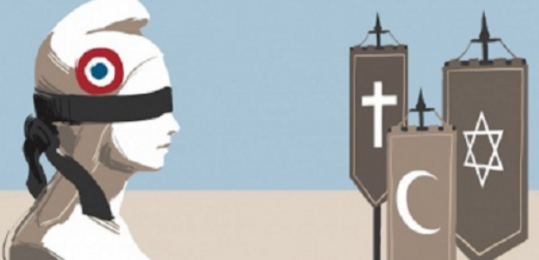4.09.2021 – Lars on laïcité
4.09.2021 - Lars on laïcité Heading link

While visiting France a few years ago, I was informed by a tour guide about a few of the differences between politics in France and America such as France’s multi-party system and their unique brand of secularism. It was very interesting to me to hear about different political structures. What piqued my interest most, was the idea of laïcité and its complexities. Most French citizens will tell you that laïcité is a backbone to not only French politics, but society as well– but what is laïcité? Laïcité is a type of secularism. The concept of secularism in America is very different from the laïcité that France knows. Laïcité has its roots in the Enlightenment period as it was a time that emphasized the importance of individual thinking and freedom as well as equality. It began with a push to keep religion, specifically the Catholic Church, out of state affairs after the French Revolution. However, laïcité was not signed into law until 1905. The law itself states that France “ensures freedom of conscience” but also “does not recognize, compensate, or subsidize any religion”.
Because of this legislation, religion is completely separate from public spaces and public servants are to remain neutral on all matters involving religion. Everyone from elected officials to public school teachers to public transport workers are prohibited from expressing their religious beliefs. Symbols and religious affiliated accessories such as crosses, yarmulkes, and religious head scarfs/wraps (i.e. hijabs, niqabs, burqas, and turbans) were banned from public schools in 2004 and in 2010 the controversial “Burqa Ban” banned full face coverings such as burqas and niqabs from public in France. Despite America’s official language that ensures a separation between church and state, laïcité is a far step away from America’s secularism. American politicians wear their religion like a badge of honor– being sworn in on holy books, citing their religion as reasons to vote/not vote for certain legislation, and even praying in Congress. These displays would not occur in France today because of laïcité.
The strength and ramifications of laïcité in France today are a topic of debate in the country. Many are pressing the government to strengthen laïcité in hopes of cracking down on terrorism. Others feel that there is a double standard as many French bank holidays actually fall on Christian holidays. To some, the restrictions in the name of laïcité do little else but oppress Muslim citizens despite its goal of neutrality and “freedom of religion”. No matter your stance on laïcité one thing is certain: the citizens of France fit a different, more diverse profile than they did in 1905– making the issue more complex than ever. For more information on this topic, I suggest watching this video: “Understanding ‘laïcité’, France’s special brand of state secularism“.
–Lars